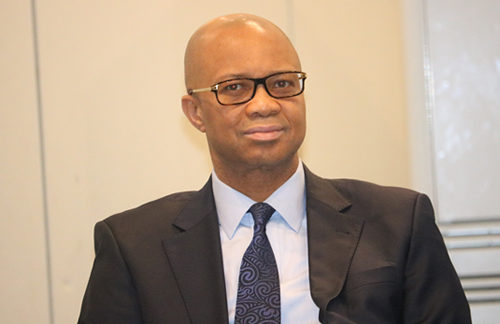The Director General, Budget Office of the Federation, Mr. Ben Akabueze, yesterday said the federal government was still mulling the removal of fuel subsidy.
He also pointed out that there were concerns over the recent increase in workers’ minimum wage.
Akabueze, said this on the ‘Morning Show,’ on Arise Television, a THISDAY sister broadcast station.
Speaking on the recent approval of a new national minimum wage and how to avert further borrowing to fund the increase, he said: “The government would make the recommendations public when it deems it necessary to do so and there is a process that is currently on-going.
“It would be difficult for me to comment even though I was a member and secretary of that committee.
“Broadly speaking, the recommendations about initiatives for raising revenues and for cutting cost where feasible.
“I can assure you that there are not much recommendations that are totally novel.”
Responding to a question on the raging debate of the fuel subsidy, he said: “Again this is a matter that is under consideration. Right now, we had a situation where the current administration has made some adjustment in petroleum pricing on PMS and because all other products have been deregulated. It is only about petrol with N145 on the price.
“Given the current dynamics of the oil market, the landing cost of PMS is more than the price ceiling and so what has happened is that the private traders of petroleum products have moved away from the market but NNPC given its commitment to ensure availability of petroleum products in the country now finds itself the only one in that business of importing and distribution.
“And in that process, is incurring losses. So the under-recovery of the trading in PMS washes off on the over recovery of profits in some other lines of their business and that is the way it is happening until we get to the point where we can make some kind of firm decision on how to proceed.
“Whatever decision we make on recovery is only interim. The goal of the administration is to increase domestic refining capacity. When we have sufficient capacity, some of the cost elements that contribute to what we call subsidy would disappear and so if the products were refined domestically, we would expect cost like transportation, financing cost for period of ordering to delivery and even the infrastructure cost that is required to manage and handle importation, insurance and more. Whatever happens to subsidy is only interim measure.”
Commenting on the controversy surrounding the federal government’s Tradermoni, he said: “Anyone that says Tradermoni is extra budgetary probably hasn’t read the budget and doesn’t understand it.
“There is a N500 billion provision in the budget and it has been there in the last three years, every year, in what we call the social investment program of the government and Tradermoni is only a small component of that.
“Tradermoni is provided for in the budget but what has happened also in terms of the delivery and mechanism for delivery. Rather than set up another agency or another structure, of government, government decided to utilise the Bank of Industry which already had an arm of it focused on MSMEs. “One of the programmes under the social investment and there are five programmes and one of them is the government empowerment programme (GEP) and Tradermoni, Marketmoni are simply just an element of that and a small one at that. So there is nothing extra budgetary about that.”
Responding to a question on the 2019 budget that was recently passed by the Senate, he said:
“As we speak, we have not received the details of what they passed from the National Assembly. And on the usual process, that when they pass the budget, they communicate details to Mr. President who passed them on to us, and we then match what they have passed to what was sent and then try to understand rationale for the changes and what need to be done to implement them and if it was implementable.”
Akabueze also explained why some items on the budget were repeated in the annual budget.
“Also, because resources are constrained, if an agency has a need for 200 computers, we then would say to them that ‘sorry, we might not be able to fund 200 computers in one year, we will be able to fund only 50 computers in a year.
“What that means is that in year one, you will see 50 computers in the budget of that agency, in year two, you would see 50 computers in the budget of that agency again, then same as year three and year four.
“But that is not repetitive, but 200 computers bought over four years.”











